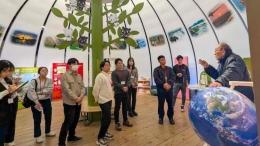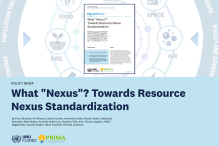Introduction
GLTP, which has been implemented by UNU-IAS since 2013, is a training scheme sponsored by the Ministry of Education, Culture, Sports, Science and Technology of Japan (MEXT), and designed to provide Japanese postgraduate students with opportunities to conduct field researches in Africa. UNU-IAS arrange for the graduate students to be interns/researchers (2-4 on a long-term basis and 6-8 on a short-term basis) at partner universities and research institutions in Africa to acquire practical skills, knowledge, and experience.
Objective
GLTP targets to enhance their leadership skills such as creativity, practicability, and self-reflection widening their eyes to analyze the complexity and interrelations of diverse issues in Africa from both global and local perspectives which enables to bring the impact at the local level linking it to the global policy and strategy. GLTP supports students to ensure their researches’ outcome is to contribute to the achievement of SDGs in Africa. The participating students, therefore, are required to deepen their ideas and analysis to strategically link their research findings to the policy recommendation for the achievement of SDGs in Africa.
Approach
GLTP has two important approaches. One is for Japanese students to be directly guided by African supervisors at the host institutes to develop a viewpoint to address the issues from an African perspective as well as to propose a solution for the side of Africa. The other is to emphasize the importance of building a mutual relationship between students and local partners. Therefore, the participating students are expected to recognize the field not only as the subject of own research but also the counterpart to share the benefit of the study, and moreover to get the feedback from them to complete the field work.
Due to the difficulties of travel under the pandemic of COVID-19 since 2020, UNU-IAS has decided to launch a six-week online training course in 2021 in collaboration with New York University and University of Johannesburg. The course included keynote lectures, workshops, resource sharing, and participatory activities prepared by African scholars and practitioners in a wide range of fields (e.g., health, education, environmental studies, human rights, law, technology, government, and civil society) from across the continent. This provides participants with an opportunity for being actively engaged with African leaders to discuss skills and strategies needed to strengthen the capacity and resilience of community and civil society, build and enhance human rights, and contribute to environmentally sustainable development across Africa to achieve SDGs. At the end, all participants need to develo research proposals and present it for sharing and discussion as a final session of the programme as a preparation of future opportunity of field works in Africa.
Achievement
So far, a total of 66 Japanese graduate students (2013–2019) from 31 universities in Japan carried out their research at 24 universities/research institutes in 13 African countries. Alumni has started developing their career in various sectors such as private companies, consulting farms, NGOs, academia, and international organizations such as World Bank, IOM, UNEP, UNICEF, and UNOHR. Please see the outputs tab for the details of results, partner universities, and students’ research reports.
- Project Manager
- Dr. Kensuke Fukushi


